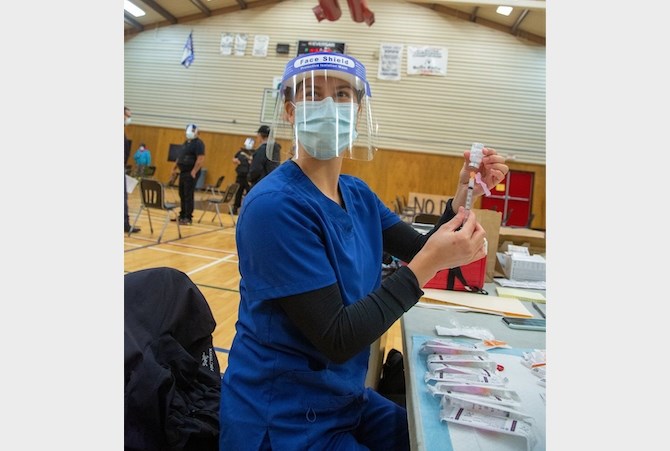
Although coronavirus infections have disproportionally spread on or near reserves, cases among B.C.'s First Nations people have been dropping in recent months. Pictured is one of Ahousaht's immunization sessions in early January 2021, part of the province's prioritization of remote Indigenous communities.
Image Credit: SUBMITTED
May 17, 2021 - 4:37 PM
Daily new counts of COVID-19 among First Nations in British Columbia continues to fall and is at its lowest level since June 2020.
According to the First Nations Health Authority’s (FNHA) latest Community Situation Report, more than 83,400 First Nations people, along with non-Indigenous people living in or near First Nations communities, have received their first dose of the COVID-19 vaccine as of May 6, 2021. More than 10,900 have received their second.
Mariah Charleson, Nuu-chah-nulth Tribal Council (NTC) vice-president, said the decreasing case count is welcome news.
“We really thank the guidance of the research that has allowed our people to be a priority,” she said. “We know that we have been hit disproportionately compared to the general population, so it’s been been really good to see [the decline.]”
At least one dose of a COVID-19 vaccine has been administered to 50 per cent of all status and eligible First Nations people within the province, the report stated.
Out of the total 7,005 cases reported, 42.8 per cent were in or near a First Nations’ community, despite 78 per cent of Indigenous people in British Columbia living off-reserve, according to the province.
“Living in rural and remote [communities] adds to the risk,” said Charleson. “When we enter a lot of our communities, you don’t have to look very hard – there’s overcrowded housing, there’s a lack of essential services. It highlights a much broader issue of the lack of capacity within many of our First Nations communities.”
While all 14 Nuu-chah-nulth nations have received their first dose of the COVID-19 vaccine, some continue to await their second.
Charleson said that FNHA has confirmed they will all receive a second dose within the 16-week period recommended by the National Advisory Committee on Immunization.
“But we can’t forget the amount of Nuu-chah-nulth people that live away from home,” she said. “We really urge communities to assist in ensuring that our vulnerable people, and all of our people, are able to receive their first and second doses.”
With guidance from the Nuuu-chah-nulth Tribal Council, the FNHA recently released a Communicable Disease Emergency Response (CDE) Planning Guide and template to help support nations develop their own CDE plan.
“The FNHA acknowledges the importance of community autonomy in choosing strategies that work best for the community,” reads the planning guide. “The outbreak mitigation resource is a collection of wisdom provided by communities during the COVID-19 pandemic, and this resource may prove helpful for other communities when faced with a communicable disease and deciding on strategies to best protect elders, knowledge keepers and community members.”
Only when COVID-19 restrictions are declared over by Provincial Health Officer, Dr. Bonnie Henry, should communities deactivate response activities, outlined the planning guide.
As communities continue to keep their guard up, recognizing the pandemic is not yet over, Charleson said that the NTC health and nursing team have been helping to guide the way by sitting on numerous committees, such as the rural and remote framework.
“[The NTC nurses] are really putting the care of our people at the centre of their work,” said Charleson. “Klecko-Klecko to them.”
— This story was originally published by Ha-Shilth-Sa.
News from © iNFOnews, 2021